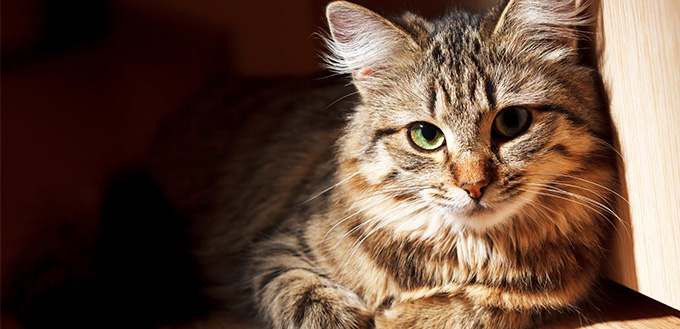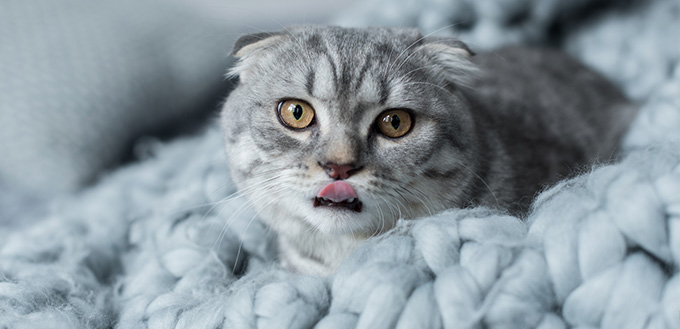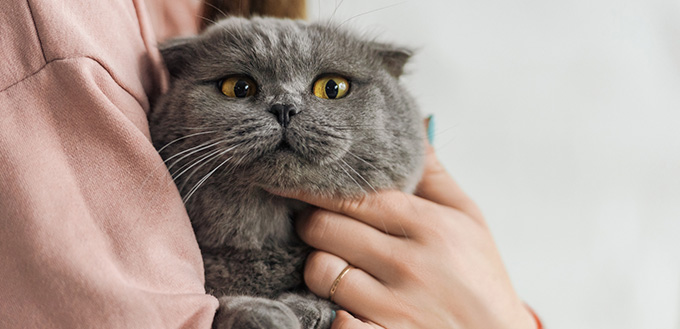Over the past few decades, mental health has increasingly taken centre stage as an important part of our well being and happiness. This has naturally led to more awareness, but also more questions. As our frame of reference and understanding of the well being of our human loved ones changes, what about our animal loved ones? More people than ever understand the symptoms of autism, for example, but what do you do when you recognize these signs in your cat?

What is Autism?
The first step is to make sure you fully understand what autism is and that you aren’t basing your knowledge on hearsay, simplified television portrayals, or misleading information. Although more widely understood and accepted now, autism has been a controversial topic in the recent past, fueled by plenty of misinformation.
The most well-known myth that was perpetuated in the 90s was that autism could be caused by vaccinations, specifically the MMR vaccine. The one study that started this belief has since been discredited by multiple subsequent studies. Nonetheless, this myth still influences many parents to avoid giving their children necessary vaccinations, and there is some concern that similarly misinformed pet parents may also avoid vaccinating their animals.
Autism spectrum disorder (ASD) is a developmental disorder that encompasses a huge range of symptoms. Due to this large number of symptoms, until relatively recently many aspects of ASD were confusingly divided into a number of disorders with different names, such as Aspergers. This is why it has now been consolidated into one broad spectrum.
Examples of these wide ranging behaviors, include:
- Sensitivity to sound, light, smell or taste
- Discomfort being touched
- Difficulty expressing their emotions and needs
- Difficulty understanding body language, vocal tones, and facial expressions
- Difficulty relating to other people
- An aversion to eye contact
- A preference for being alone
- A need for routine
- An enjoyment of repetition, such as words, phrases or actions
Research is still being done to better understand this disorder so that we may increase our ability to diagnose it and improve the quality of life for those living with it. A huge part of this is understanding its cause. While it is clear that it has a genetic cause, many genes have been found to have an influence and there is a lot more research needed before we can say we fully understand it.
Cats and Autistic Behavior
Using that list of symptoms, it is pretty clear why many cat owners have concerns that their cats may have autism spectrum disorder. After all, most cats will display at least one of those symptoms as part of normal cat behavior. Four cat behaviors, in particular, come up time and time again: their intelligence, sensory sensitivity, vocalizations, and dislike of social interaction.
1. Autism and Your Cat’s Intelligence
An aspect of autism that we didn’t cover above, but is very well known, is their propensity for increased skill in fields such as maths and music. It is worth noting that this symptom of autism is frequently overstated in various television show, which has resulted in the stereotype of the autistic misanthropic genius. The truth is that many people with ASD will not have notable ‘super-skills’, although it is true that some others may excel in certain areas.
This leads some cat owners to suspect that their cat’s brilliance could be a sign of autism. However, cats are just naturally intelligent animals, with some breeds in particularly being even more gifted than average. For example, Abyssinians and Birmans are very intelligent breeds that are often mistakenly thought by their owners to be autistic.
A cat that displays an unusual ability to focus and concentrate is probably a very intelligent cat, but this is not the same as autism. It is worth looking into how you can stimulate this intelligence through play and training as an intelligent cat will get bored easily, and might take out this boredom on their surroundings.
2. Autism and Your Cat’s Sensory Sensitivity
While an intense focus and intelligence is often mistaken for a sign of autism in cats, there is also the other side of the coin – a lack of focus, and sensitivity. As we have mentioned above, sensitivity to light, sound, taste, and smells, as well as a dislike of being touched are all symptoms of ASD in humans. However, the same behavior in cats is not a sign of cat autism.
Cats can sometimes appear to be disorientated, uncoordinated or unresponsive. Some owners suspect that this is a sign that they are struggling with a sensory overload, and therefore associate it with autism. However, this behavior is often actually a sign of other potential health issues, such as organ failure, infections, and depression.
Your cat may not be suffering from autism, but any unexplained, unusual, or changed behavior is worth investigating with vet. It may turn out to be nothing, but it is always worthwhile to get them checked out. What is fairly certain, however, is that they do not have autism.

3. Autism and Your Cat’s Socialization
Another well-known sign of autism is discomfort with social behavior. In humans, this may result in avoiding eye contact or avoiding social situations entirely, and cats frequently display this behavior, which can worry their owners. Uneventful play dates with other cats, for example, where your cat seems to avoid the other cat, or hiding when your friends visit you are common behaviors that can appear antisocial, but the truth is that this is normal cat behavior.
Similarly, cats love and need routine. This is why you should aim to feed them and let them outside at the same time every day. Although this love of routine is a known symptom of ASD in humans, it is a consistent need across the entire cat species. If your cat’s behavior is unusual, it is worth considering whether it can be explained due to the break in routine that a particular social event represents.
Generally, kittens that have experienced a lot of socialization will be more amenable to other strange animals and humans. This can also help prevent other aggression issues that you may face when your kitten becomes an adult cat. If your cat did not socialize much as a kitten, this probably explains their behavior. Don’t worry, though, you can still train an adult to get used to socializing if you are worried that their behavior is a problem.
4. Autism and Your Cat’s Vocalizations
Often the most common symptoms in human patients of autism spectrum disorder are issues surrounding communication. This can range from refusing to verbalize to excessive vocalizations, often directed at one specific person who they are very familiar with. Once again, cat parents often misinterpret similar signs in their cats as autism.
As before, breed is an important factor to consider when understanding your cat’s vocalizations. Some breeds are very talkative, and others are not. The Oriental Shorthair, for example, will talk your ear off, but that isn’t a sign they are autistic.
From purring to meowing, your cat may choose to only chatter away to you, but this is often very common in an animal that is not keen on strangers. They often bond closely to the person who feeds them most often, and will shy away from others, including other family members.
Don’t worry if your cat is very talkative or very quiet. The most important thing to consider is their distress levels, or if their behavior is a sudden and unexplained change from their normal behavior. As always, if you have serious concerns, visit a vet.
Could My Cat Be Autistic?
As you’ve probably guessed the answer is no. There is no evidence to suggest that your cat can have autism. Research into animals and mental health is still in it’s early stages, but researchers have not found any links between cats and autism. They have, however, ascertained that cats can struggle with anxiety and OCD, and it is interesting to note that research has suggested that some dogs could have a form of ASD.
So why might owners think that their cats have autism? Well, first of all, cats do tend to have less sociable personalities when compared to humans. They are often more sensitive than humans as well, startling at noises and sounds that we find very explainable. It is perfectly normal for a cat to spend much of their time alone and to be on high-alert. They are, after all, fundamentally solitary, carnivorous predators.
Ultimately, many of the symptoms that demonstrate unusual behavior in humans, are just demonstrating normal behavior in cats. Many pet owners do tend to anthropomorphize their animals. This means they are prescribing human behavioral expectations, such as guilt or, in this case, enjoyment of social activity. Generally, this is part of the fun of being a pet owner, but it is important not to let it affect your treatment of your cat and how you meet their non-human needs.
For example, you can’t expect your cat to understand the privilege of becoming instagram famous, while you break their routine and territorial security in favor of taking them to a variety of beautiful locations ‘for the gram’. This lack of security can cause anxieties, aggression, or a whole host of mental health or behavioral problems.

Cats, Children and Autism
Although it is fairly certain that your cat does not have autism, there is a fantastic link between cats and autism that is definitely worth knowing about. A very recent study has found that cats may be a beneficial companion for children with autism spectrum disorder.
Animals have often been considered as beneficial for children with ASD as they can struggle with isolation. Pets are often less judgemental than other children, which means that pets provide a stable companionship. Dogs, for example, are known to be good companions because they provide a sense of protection and calm, but this new study suggests that cats may be an even better companion.
The study even found evidence to suggest that some cats are more positive towards children with ASD than other family members as cats that were affectionate to a child with ASD did not display the same amount of affection with anyone else in the household.
Unfortunately, this research is still in very early stages and we cannot assume too much from correlations found in the study. However, the researchers have highlighted that finding the right cat for an ASD child is essential. Therefore, if you are thinking about how a cat may help a child with ASD, it is worth noting that:
- The best bonds occurred in cats that were adopted as kittens. It is probable that this early bonding was essential in creating cats that were particularly affectionate and protective.
- In most cases in this study, the primary interaction between the cat and the child was hugging, otherwise, most of the ASD children did not spend much time with the family cats.
- The best cat companions are affectionate, socially outgoing, and have low aggression. Therefore, while a cat’s naturally aloof personality may helpfully reflect ASD behavior, it is unhelpful for the cat to reject the child.
- Ultimately, a balance is probably needed to allow for the child to have the control in the relationship. Unlike a dog, a cat is unlikely to force itself into anyone’s personal space when it is unwanted, but an affectionate cat will still enjoy being picked up and hugged.
- Avoid very skittish breeds as your cat must be comfortable with a certain amount of unpredictable behavior, such as sudden vocalizations. Fortunately, if you are introducing a kitten or young cat to your household, they are quite likely to adapt well, but don’t be afraid to provide additional training.
It is worthwhile to discuss with your doctor if you are unsure. Remember that ASD children have such a wide variety of symptoms and behaviors that it is very unlikely that any one aid will suit everyone. Generally, pets are more likely to help children with tactile issues. They are enjoyable for children who enjoy tactile experiences, and may help a child with tactile aversion to overcome some of their sensitivities.
Sources:
- Renee A. Alli, What Is Autism Spectrum Disorder?, WebMD
- Patrick Mahaney, VMD, CVA, CVJ, The Role Pets Play in Helping Autistic Children, PetMD








When my Sylvester my cat goes to sleep he sleeps strentchs his body out against the wall.and he chatters to me.and doesn’t like some of my family members he hises at them and growls at certain people and he very protective of me and he doesn’t like noises or When I am crying he comes to me because he thinks I am hurt and he doesn’t like the grandkids fight.
Hey Pawtracks, you and me bro. Battle, cat, autism.